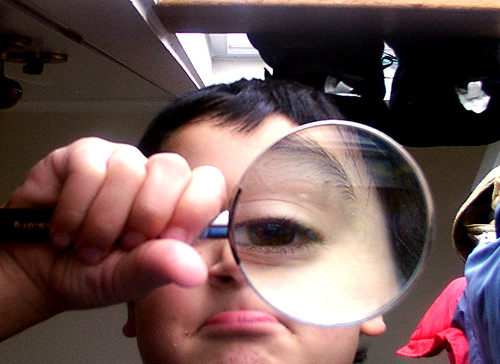We run our website the way we wished the whole internet worked: we provide high quality original content with no ads. We are funded solely by your direct support. Please consider supporting this project.

Rethinking Our View of Faith
The second conviction of the “ReKnew Manifesto” is that we need to rethink what it means to have faith. It’s my impression that many, if not most, Evangelical Christians associate their assurance that they’re “saved” with their confidence that they believe correct doctrines. This is why many, if not most, think that heretics who believe wrong doctrines are lost. This way of feeling assured is also related to the widespread assumption that a person’s faith is as strong as the person is certain — hence, free of doubt — regarding their beliefs.
We believe its time to reexamine what it means to have faith.
In my previous post I argued that many Christian’s model of faith is closer to magic than the biblical understanding of faith. In the book I’m working on (presently entitled, Benefit of the Doubt) I have four chapters of other arguments against this model. In this and my next post I’ll briefly outline eight of these arguments, covering four in each post.
So here we go….
* The model of faith that encourages people to shun doubt and strive for certainty makes a virtue out of a non-virtuous behavior.
Why would God leverage a person’s salvation — and in some forms of Christianity, other “blessings” such as getting healed as well — on the degree to which people can convince themselves of something? What is virtuous about this ability? The capacity of a person to engage in this behavior has nothing to do with their character.
The truth is, the more rational and sober-minded a person is, the worse they will be at doing this. But the more simple or delusional a person is, the better they will be at doing this. And either way, character doesn’t factor into the equation. So why would God make faith the centerpiece of his relationship with us, if this is what faith is all about?
* The certainty-seeking, doubt-shunning model of faith reduces faith to mental gimmickry.
As I flesh it out in Benefit of the Doubt, the biblical model of faith is all about character. It’s a beautiful covenantal concept that concerns our trust in another and our trustworthiness in relationship with another. This kind of faith isn’t concerned with becoming psychologically certain of anything. To the contrary, this kind of faith addresses our character precisely because it’s about our willingness to commit to a course of action in the face of uncertainty. The certainty-seeking model of faith reduces this beautiful covenantal concept down to a mental gimmick, for the fact of the matter is that being able to push doubt aside and become certain of something by an act of will is a mental trick that some people can play on themselves while others cannot.
* The certainty-seeking model of faith is irrational.
The rational way to form beliefs is to base our level of confidence in a belief on the strength of evidence and/or arguments for or against it. The stronger the evidence and/or arguments are for a belief, the greater our confidence that the belief is true. Trying, by an act of will, to bump our confidence beyond what evidence warrants is simply irrational. Yet, to the thinking of many Christians, people’s eternal fate depends on their ability to do just this!
* The doubt-shunning model of faith is not concerned with truth.
Suppose I’m purchasing a car, about which the dealer makes many great claims to justify the exorbitant price he’s asking for it. Before I lay down my hard-earned cash, I will want to thoroughly check out this car to determine if the dealer’s claims are true. (Actually, I’d hire someone else to do this since I know nothing about cars.) This is what we must do whenever we are concerned with determining whether or not a truth claim is actually true.
In this light, what are we to make of the model of faith that encourages believers to shun doubt and strive to be as certain as possible that the things they already believe are true? The unavoidable answer is that they simply cannot be concerned with the truthfulness of their beliefs. The fact of the matter is that one cannot be concerned with believing the truth if they’re at the same time trying to convince themselves that what they already believe is true. One has to be willing to doubt what they presently believe is true if they are going to be concerned with the truthfulness of what they believe.
I am not questioning the sincerity of those who embrace this model of faith when they claim to believe the truth. But with all due respect, I can’t see how to avoid the conclusion that they are sincerely deluding themselves.
Think about it. In my next post I’ll offer up four other even more serious arguments against the faith-seeking, doubt-shunning model of faith.
Until then, I encourage you to trust the character of the God revealed in Christ and to live in a trustworthy relationship with this God. But please, please don’t get sucked into thinking you’re ever supposed to suppress doubt and convince yourself of anything!
Image by chrisbrenschmidt. Used in accordance with Creative Commons. Sourced via Flickr.
Related Reading

Benefit of the Doubt: Sneak Peek
We’ll be leaking little tidbits from Greg’s soon-to-be-released book Benefit of the Doubt from today until the book release. We’re really excited about the potential of this book to impact the lives of those who have limped along with the assumption that doubts and questions disqualify them as “faithful”. Here’s today’s snippet: The truth is,…

The Cross Above All Else
The way to know what a person or people group really believes is not to ask them but to watch them. Christians frequently say, “It’s all about Jesus,” but our actions betray us. Judging by the amount of time, energy, and emotion that many put into fighting a multitude of battles, ranging from the defense…

A ReKnew Manifesto
As our curious name indicates, ReKnew exists to encourage believers and skeptics alike to re-think things they thought they already knew. We want to promote a beautiful, Jesus-looking vision of God and his kingdom. We want to promote a host of related theological convictions that we believe were compromised or lost in traditional Christianity—especially since…

What Type of Faith Do You Have?
Genesis 32 tells the story of Jacob, wrestling through the night with a nameless man, revealed to be none other than God Himself. We read that when this man “saw that he could not overpower” Jacob, he “touched the socket of Jacob’s hip so that his hip was wrenched as he wrestled with the man”…

Do You Have Enough Faith?
What does it actually mean to have faith? This is a topic I address at length in Benefit of the Doubt, but this post provides a very basic answer to this question. To appropriately understand the New Testament’s teaching on faith, we need to understand faith within the context of our marriage-like covenant with God…

The Benefit of the Doubt
In my last two posts (here and here) I’ve given five arguments against the common way Evangelical Christians tend to think about faith. More specifically, I’m calling into question the assumption that a person’s faith is as strong as they are free of doubt. I’ll conclude this line of questioning today by offering four other…
